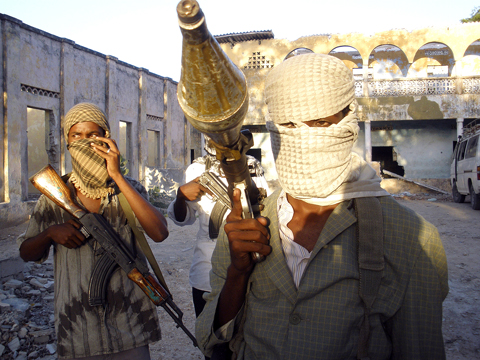The Djibouti peace process is at risk of going “down the drain” and needs urgent support from the Organization of the Islamic Conference (OIC), the OIC chief said on Saturday.
Secretary-General Ekmeleddin Ihsanoglu told a meeting of OIC foreign ministers that they needed to contribute troops, equipment and financial support to the African Union Mission to Somalia to prevent the collapse of the peace process when Ethiopia pulls out its troops from the country in the coming days.
“The Djibouti peace process, which remains the only credible political process currently under way in Somalia, in which the OIC is a major international stakeholder and facilitator, is under severe threat,” Ihsanoglu said.

PHOTO: AP
“Our heavy investment in the process, which produced the historic Djibouti Peace Agreement between the Transitional Federal Government and the coalition of the opposition ... must not be allowed to go down the drain and needs the full support of all the member states,” Ihsanoglu said.
Ihsanoglu also called on OIC members to offer up humanitarian assistance to Somalians and for the organization to open up an office in Mogadishu “as a symbol of our enduring engagement with Somalia.”
Ethiopia pledged on Saturday that it would not leave behind a power vacuum when it completed its troop withdrawal from Somalia in the coming days, two years after it invaded the country.
There are 3,600 Ugandan and Burundian African Union peacekeepers in Somalia, but they are ill-equipped and under-funded and have been unable to restore stability in the country.
Ethiopia invaded Somalia in 2006 to rescue an embattled transitional administration and oust the Islamic Courts Union, which had taken control of most of the country and started imposing a strict form of Shariah.
Ethiopia’s pullout was agreed upon by the Somali government and the more moderate wing of the Islamist-led political opposition during UN-sponsored reconciliation talks in Djibouti.
In Somalia, Islamic insurgents appeared to be scrambling for power, taking over several police stations in the capital as Ethiopian troops began to pull out, witnesses said.
Many fear the Ethiopian pullout — and last month’s resignation of Somalia’s president — will cause Islamic militant groups to fight among themselves for power, bringing even more chaos.
“We have to show commitment to do our part in security, we want to help people feel secure,” Abdirahim Issa Adow, a spokesman for one wing of the insurgency, told reporters on Saturday after deploying troops to three of Mogadishu’s 14 police stations.
His Union of Islamic Courts is not allied to the most powerful insurgent group, al-Shabab, which has taken over most of Somalia.
The US accuses al-Shabab of harboring the al-Qaeda-linked terrorists who blew up the US embassies in Kenya and Tanzania in 1998. Many of the insurgency’s senior figures are Islamic radicals; some are on the US State Department’s list of wanted terrorists.
The Somali government controls only Baidoa, the seat of Parliament, and pockets of Mogadishu. There is no effective military or police force; some police bases are occupied by government forces and others are vacant. The three taken over on Saturday were vacated months ago.

Kehinde Sanni spends his days smoothing out dents and repainting scratched bumpers in a modest autobody shop in Lagos. He has never left Nigeria, yet he speaks glowingly of Burkina Faso military leader Ibrahim Traore. “Nigeria needs someone like Ibrahim Traore of Burkina Faso. He is doing well for his country,” Sanni said. His admiration is shaped by a steady stream of viral videos, memes and social media posts — many misleading or outright false — portraying Traore as a fearless reformer who defied Western powers and reclaimed his country’s dignity. The Burkinabe strongman swept into power following a coup in September 2022

‘FRAGMENTING’: British politics have for a long time been dominated by the Labor Party and the Tories, but polls suggest that Reform now poses a significant challenge Hard-right upstarts Reform UK snatched a parliamentary seat from British Prime Minister Keir Starmer’s Labor Party yesterday in local elections that dealt a blow to the UK’s two establishment parties. Reform, led by anti-immigrant firebrand Nigel Farage, won the by-election in Runcorn and Helsby in northwest England by just six votes, as it picked up gains in other localities, including one mayoralty. The group’s strong showing continues momentum it built up at last year’s general election and appears to confirm a trend that the UK is entering an era of multi-party politics. “For the movement, for the party it’s a very, very big

ENTERTAINMENT: Rio officials have a history of organizing massive concerts on Copacabana Beach, with Madonna’s show drawing about 1.6 million fans last year Lady Gaga on Saturday night gave a free concert in front of 2 million fans who poured onto Copacabana Beach in Rio de Janeiro for the biggest show of her career. “Tonight, we’re making history... Thank you for making history with me,” Lady Gaga told a screaming crowd. The Mother Monster, as she is known, started the show at about 10:10pm local time with her 2011 song Bloody Mary. Cries of joy rose from the tightly packed fans who sang and danced shoulder-to-shoulder on the vast stretch of sand. Concert organizers said 2.1 million people attended the show. Lady Gaga

SUPPORT: The Australian prime minister promised to back Kyiv against Russia’s invasion, saying: ‘That’s my government’s position. It was yesterday. It still is’ Left-leaning Australian Prime Minister Anthony Albanese yesterday basked in his landslide election win, promising a “disciplined, orderly” government to confront cost-of-living pain and tariff turmoil. People clapped as the 62-year-old and his fiancee, Jodie Haydon, who visited his old inner Sydney haunt, Cafe Italia, surrounded by a crowd of jostling photographers and journalists. Albanese’s Labor Party is on course to win at least 83 seats in the 150-member parliament, partial results showed. Opposition leader Peter Dutton’s conservative Liberal-National coalition had just 38 seats, and other parties 12. Another 17 seats were still in doubt. “We will be a disciplined, orderly